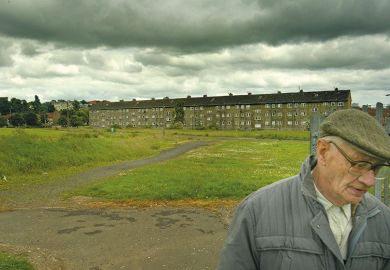In 2016, Quentin Tarantino’s Hateful Eight won a Golden Globe for best music score. On receiving the prize, Tarantino commented that the winner did not come from the “ghetto” of movie composers, meaning that he was more creative and independent than others. But using the word “ghetto” to stigmatise was rightly deemed unacceptable. The African American actor Jamie Foxx, one of the Golden Globes presenters, quickly intervened and made his feelings clear by repeating the word “ghetto” to overwhelming applause. At the same time, in Venice, there was a year of celebration to mark the 500th anniversary of the original “ghetto” where the word was fully embraced.
Hence “the Year of the Ghetto”, as 2016 was called by those who wrote about the Venetian anniversary, took very different forms in Europe and America. The black ghetto has existed for over a century in America – from the turn of the 19th century to the present day – and, as Lance Freeman shows, is now regarded as a purely national phenomenon. A Haven and a Hell challenges the myths of stigmatisation, deprivation and victimhood that characterise contemporary perceptions of the ghetto and its so-called underclass. Rather than the “dark ghetto”, there is a range of alternative histories which includes black empowerment, community-building and urban regeneration.
Ghettos in the United States were formed in the cities of the urban north outside the confederacy. The best known are Chicago’s South Side, New York’s Harlem and South-Central Los Angeles. The increased black presence in most sizeable northern cities was a product of the Great Migration from the south to the north. This internal migration repopulated the ghettos up until the destructive riots at the end of the 1960s. Migration is the main reason why the American ghetto has such longevity. It is why ghettos were perennially viewed as “havens” or promised lands away from slavery, lynching and segregation. With tens of thousands of residents in the rural southern states excluded from the industrial revolution, ghettos were often on the side of modernisation and integration.
The strength of Freeman’s dualistic approach, stressing both the positives and the negatives of ghetto life, is that it explains the multiple dimensions of ghettoisation. Ghettos were places where banks could be founded, entrepreneurs and politicians could flourish, and residents could create art of the highest order (most notably during the Harlem Renaissance). But this depended on the state of the economy as a whole. Ghettos suffered during the Great Depression – alongside the rest of the United States – but thrived during the First World War when industrial labour was needed and, after the Second World War, during the boom years, up until the 1960s.
The weakness of this book is that it reduces the history of the ghetto to the question of whether it is good or bad (a “haven” or a “hell”) for “the race” (a metaphor used throughout). No comparative works are referred to (not even Mitchell Duneier’s influential 2016 survey, Ghetto: The Invention of a Place, the History of an Idea, which goes back to the earliest studies) and nothing that challenges the “dark ghetto” on the grounds of social justice (Tommie Shelby’s powerful case that, in a just world, ghettos should not exist is ignored). Instead, in this important but limited account, every hellish ghetto has a silver lining. This may well be a testament to the indomitable spirit of African Americans but can distort a complex reality.
Bryan Cheyette is professor of modern literature and culture at the University of Reading. He is currently completing a short book on The Ghetto for Oxford University Press.
A Haven and a Hell: The Ghetto in Black America
By Lance Freeman
Columbia University Press, 328pp, £25.00
ISBN 9780231184601
Published 16 April 2019
Register to continue
Why register?
- Registration is free and only takes a moment
- Once registered, you can read 3 articles a month
- Sign up for our newsletter
Subscribe
Or subscribe for unlimited access to:
- Unlimited access to news, views, insights & reviews
- Digital editions
- Digital access to THE’s university and college rankings analysis
Already registered or a current subscriber?






